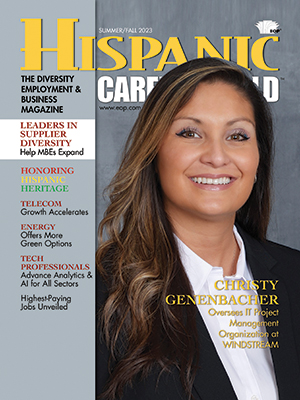| |

Hispanic Career World Magazine, launched in 2001 is the recruitment link between students and professionals who are Hispanic and the employers that seek to hire them. This publication offers career-guidance columns, news, and feature articles that profile Hispanics in all fields.
This magazine reaches students, graduate students and professionals in all careers at their home addresses.
If you are a Hispanic college student or professional, Hispanic Career World is available to you FREE!

|
|
 Hispanic Career World
Hispanic Career World
» Featured Articles
» Subscription Information
» Reader Survey
» Companies Actively Recruiting

How to Work Remotely & Stress-Free
Working from home can be isolating, and living with uncertainty is stressful. Below, we’ve pulled together our top tips for both.
Here are our tips:
1. Emotionally proofread your messages. Always re-read what you’ve written before hitting send to make sure your message is clear and conveys the intended tone. Sending, “Let’s talk” when you mean, “These are good suggestions, let’s discuss how to work them into the draft” will make the recipient unnecessarily anxious. If you’re worried about how your tone will come across, then pick up the phone. Your colleague (who may also be working from home) might be glad for the chance to talk.
2. Be mindful of time zones. To help people in all time zones feel included, strive to delay decision-making until you’ve heard from everyone who should be involved. And if you occasionally need to ask a colleague to join a meeting outside of their normal work hours, then we recommend skipping video. It’s much easier to join if you’re not expected to be camera-ready.
3. Schedule time for serendipitous collaboration. When we work remotely, we miss out on all of the impromptu moments with our colleagues that lead to good ideas: chatting before and after meetings, catching up in the kitchen or hallways, and stopping by each others’ desks. When meeting via phone or video conference, schedule time for informal conversation at the beginning and end of meetings.
4. Make room for mini-breaks. Stepping away from your desk for even five minutes helps you relax, and stay focused. Danish students who were given a short break before taking a test got significantly higher scores than their peers who didn’t get any time to relax.
5. Set up an after-work ritual. It’s easy to overwork when you don’t leave a physical office at a specific time each day, making it extra important to keep healthy boundaries. Your brain will benefit from a signal that tells it, “Work is over!” Some ideas: meditate, listen to music, read a magazine, or lift weights (some studies show weight training boosts your mood more than cardio). Cal Newport, author of Deep Work, ends each day by transcribing any loose notes into a master task list, shutting his computer, and then saying the phrase, “Schedule shutdown, complete.” He writes: “Here’s my rule. After I’ve uttered the magic phrase, if a work-related worry pops to mind, I always answer it with the following thought process: I said the termination phrase.”
6. Put time on your calendar to exercise. Commit to getting some physical activity by blocking off time to work out on your calendar. Need some working-out-from-home ideas? Try a seven-minute workout, youtube.com/watch?v=mmq5zZfmIws, 17 Desk Stretches That’ll (Almost) Replace Going to the Gym, themuse.com/advice/17-desk-stretches-thatll-almost-replace-going-to-the-gym, or just put on your favorite song and dance it out. Even better, make it a virtual group activity. Jump on a video call with a friend, pick a fitness YouTube video, and get your sweat on together.
7. Check in on each other. This can be done by setting up virtual lunches, tea times or what Buffer terms “pair calls.” Buffer employees opt in to be randomly paired with someone else at the company once a week. Calls have no set agenda; coworkers get to know each other in pairs by talking about their families, hobbies and favorite shows.
These are uncertain times in which it's more important than ever for us to support each other.
– Liz Fosslien and Mollie West Duffy
Source: lizandmollie.com
About the Authors: Fosslien and Duffy are the co-authors of No Hard Feelings: The Secret Power of Embracing Emotion at Work, and Fosslien is the illustrator of the book. She’s responsible for content at Humu, a machine learning company founded by Laszlo Bock that uses behavioral science to make work better. Duffy leads organizational development at RALLY, and was previously an organizational design lead at global innovation firm IDEO.
 » Feedback for the Editor
» Feedback for the Editor
» Request Article Copy
|
|